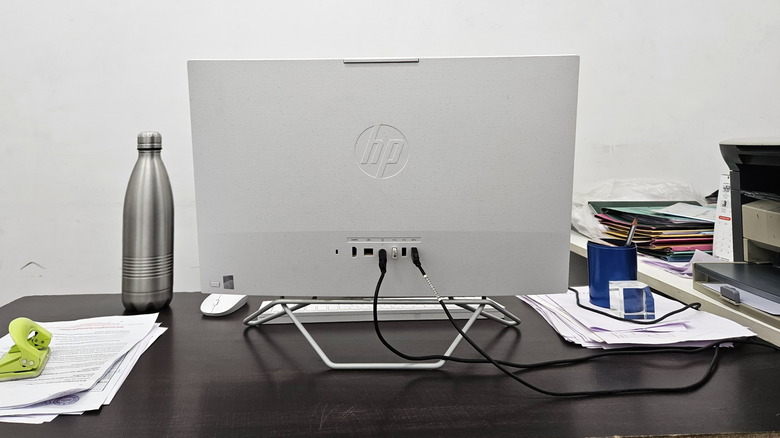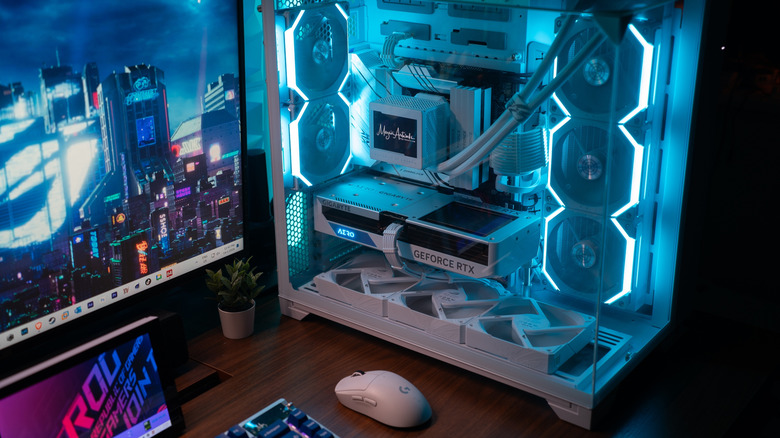What Does AIO Stand For? The Meaning Behind The Abbreviation Explained
If you've been in the market for a new computer, there's a good chance you've seen the term AIO thrown around. It can be difficult to assess what the term means, since it is extremely context-dependent. You may have encountered it when shopping for multiple different types of computers. It's especially prevalent in the world of custom-built PCs, but you may also hear it when shopping for a prebuilt system.
As it turns out, AIO, or "all-in-one," is a fairly flexible term that can refer to anything that integrates multiple parts that would usually be separate into a single product. However, with that in mind, there are two types of products you'll hear referred to as AIO: liquid PC coolers and integrated desktops. These uses of AIO should be disambiguated from other terms we won't discuss in this article like AI/O (asynchronous input/output) and artificial intelligence optimization, or various medical terms (adhesive intestinal obstruction, sounds awful — new fear unlocked). In this article, we'll break down the most common uses of the term as it relates to consumer computer hardware. Here's what you need to know.
AIO can refer to all-in-one desktop PCs
AIO is an abbreviation that usually means "all-in-one," but it has multiple applications in the realm of computers. One common meaning is a desktop computer that contains all of its components within a single unit that includes a display. The most straightforward example of an all-in-one desktop is the Apple iMac, which has been a staple of school computer labs, households, and offices for decades. Rather than the computer and display monitor being two separate units, the iMac integrates its motherboard, processor, RAM, storage, and more into the display itself. All a user needs to do is connect a mouse and keyboard. Other AIO desktops include the Microsoft Surface Studio, which folds down to become a massive desktop tablet for artists, and the Lenovo 24 All-In-One, which is closer to the sort of thing you might see on a receptionist's desk at a doctor's office.
In addition to being convenient, especially for users who aren't very comfortable with or knowledgeable about computers, all-in-one desktops have two more benefits. First, they're often relatively cheap, with many priced at under $1,000. Bulk deals make them even more affordable, which goes a long way to explain their popularity in offices and schools. Second, they're space savers, eliminating the need to make room for a big desktop tower while also cutting down on cable management.
AIO can also refer to PC liquid coolers
Another common use of the AIO abbreviation appears in the realm of PC components, where it can refer to an all-in-one cooler. Water cooling has become increasingly popular among custom PC enthusiasts, as it provides more effective cooling for CPUs during intense workloads compared to traditional air coolers that use heat pipes and fans. However, cooling with a custom loop is rather complicated, requiring multiple components including a radiator, pump, reservoir, and water block. In addition to the complexity of assembling such a system, you risk spilling the cooling liquid into your system if you're not careful, and you need to maintain it by changing out the liquid every so often.
That's where AIO coolers come in. They have all the necessary components of a cooling loop, but are contained in a single closed ecosystem within a single unit. An AIO cooler has a pump with a cold plate that mounts to the CPU. This is connected by tubes to a radiator with fans that mounts (in most instances) on the top or back of the PC case. Unlike cooling loops, AIO coolers come pre-filled with water-based coolant, so you never have to worry about spills. You also don't need to refill AIO coolers. The liquid inside lasts for the lifetime of the AIO. Cooling loops can be more fun, with some PC enthusiasts using them to add flair to their PCs. Lately, though, more AIOs come with RGB effects and other aesthetic touches. When trying to choose the right cooling kit for your PC, these factors make AIO coolers the best choice for people who aren't experienced PC builders.


